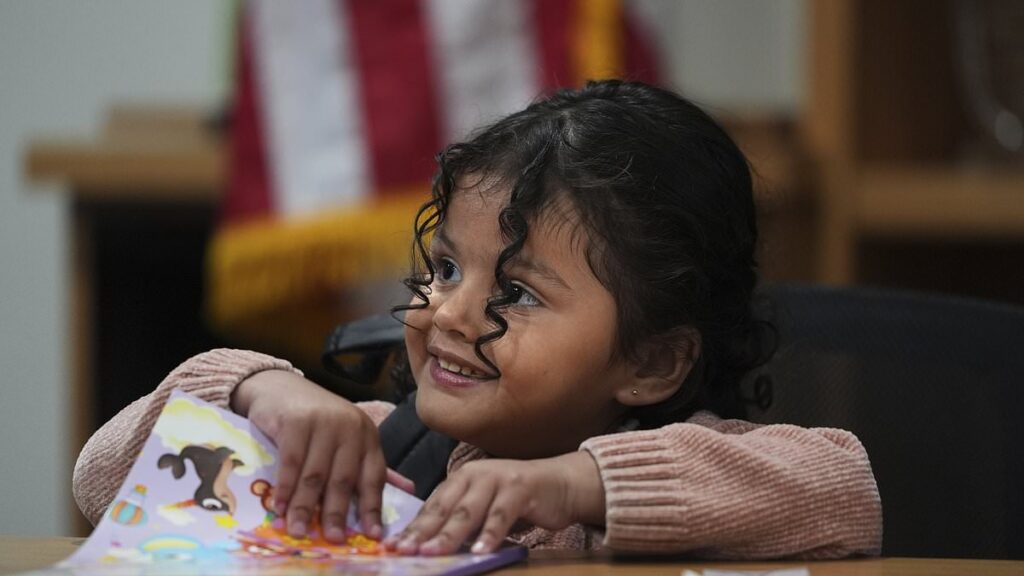Donald Trump’s Department of Homeland Security granted an adorable Mexican migrant girl, 4, humanitarian parole so she could continue to receive life-saving care in California.
The department has cracked down on undocumented migration and dismantled a Biden-era policy that allowed migrants to request humanitarian parole on a mobile app.
Deysi Vargas and her daughter, who was identified only by her initials, received legal immigration status in 2023 so that the girl could receive care for short bowel syndrome.
The family’s attorneys at Public Counsel said in a statement that they received parole on June 2 and will expire in one year.
‘While we celebrate this victory, we cannot ignore the systemic challenges that brought Sofia to the brink,’ the family’s attorneys said in a statement, referring to the girl using a pseudonym.
‘Her parole was terminated without warning, and for weeks there was no functional avenue to alert USCIS that a child’s life was in danger. It took an international outcry and pressure from elected officials to get a response—something that used to take a single phone call.’
The statement added that there are many stories similar to the girl, ‘but the danger they face is every bit as real’ and that the immigration system ‘must protect everyone facing life-threatening harm.’
Vargas’ daughter, who was identified by the initials, SGV, receives daily treatment to get her nutrition using a portable backpack.
A Mexican migrant girl was granted humanitarian parole to continue receiving life saving treatment
Trump has come under fire for his administration’s aggressive mass deportations
She receives her care through a process called Total Parenteral Nutrition (TPN), which feeds her using an IV.
Only a few countries including the US can administer the treatment and the equipment cannot travel outside of the country.
The family flew into a panic in April when they received a letter from DHS notifying them that their parole had been revoked, according to Vargas’ attorneys at Public Counsel.
Brown said in a statement at the time that SGV was receiving specialized care at Children’s Hospital Los Angeles.
‘To suddenly yank away that welcome mat, take away her life-saving medical care, and force her back to a place where she could die within days is a cruel betrayal of our nation’s word and an affront to our shared humanity,’ Brown continued.
Vargas shared her story at a news conference in May, telling reporters, ‘If they deport us and take away my daughter’s access to her specialized care, she will die.’
‘Now, with the help my daughter receives in the United States, my daughter has the opportunity to leave the hospital, see the world, and live like a child her age,’ she added.
The family’s attorneys said their humanitarian parole was set to expire at the end of July but Vargas had been working to get it extended.
The girl’s mother previously said her life would be at risk if she was deported and stopped receiving the care
Doctors warned that she couldn’t travel outside of the country without the equipment and her condition could become fatal
The girl was diagnosed with short bowel syndrome and was receiving treatment through an IV using a backpack
Public Counsel said in a statement to the Associated Press that while they were grateful the family received humanitarian parole, the case demonstrated a lack of communication with officials.
‘We cannot ignore the systemic challenges that brought Sofia to the brink,’ the statement read, referring to the girl as ‘Sofia’ using a pseudonym.
‘Her parole was terminated without warning … It took an international outcry and pressure from elected officials to get a response—something that used to take a single phone call.’
SGV requires the treatment with her for 14 hours a day, but can leave the hospital with the backpack.
The girl’s physician, Dr. John Arsenault, who sees her every six weeks wrote a letter obtained by the Los Angeles Times that said SGV’s condition could be fatal ‘within a matter of days’ if she lost her treatment.
‘As such, patients on home TPN are not allowed to leave the country because the infrastructure to provide TPN or provide immediate intervention if there is a problem with IV access depends on our program’s utilization of U.S.-based healthcare resources and does not transfer across borders,’ Arsenault added.
While she was in Mexico, SGV experienced repeated blood infections and underwent six surgeries.
The family can stay in the country on humanitarian parole until June 2. DailyMail.com reached out to DHS for additional information but didn’t immediately hear back.
